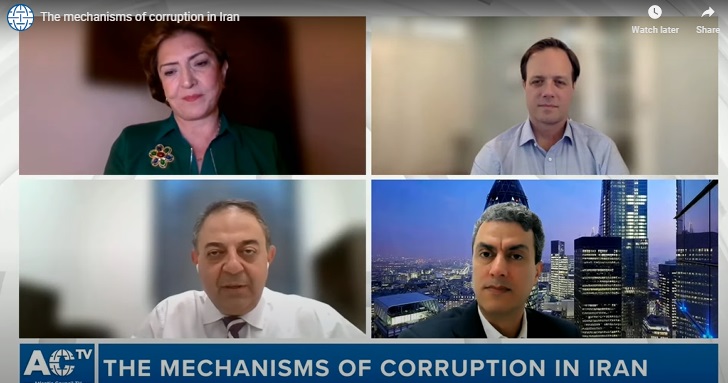On June 13, the Atlantic Council’s Iran Strategy Project hosted a virtual event, “The Mechanisms of Corruption in Iran” to discuss the nature of corruption and sanctions in Iran as well as the social, economic, and political implications of these issues.
The Atlantic Council’s Scowcroft Middle East Security Initiative Director, Jonathan Panikoff conducted opening remarks, stating that discussions of Iran’s current economic situation must also address the corruption that exists within the country given its rampant nature. This was emphasized by Atlantic Council nonresident senior fellow Nadereh Chamlou who served as the moderator for the session.
In order to discuss the complexities of corruption within Iran, it is first important to define corruption. Associate Professor of Finance at the University of Dallas, Ali Dadpay, explained that corruption is the use of a public position for personal gain. Dadpay shared how this phenomenon manifests in situations such as the importation of luxury vehicles into the Islamic Republic. He recalled how foreign made vehicles were banned from Iran, however, members of Parliament were able to import foreign made luxury vehicles due to their positions of power.
Causes of Sanctions and Corruption
The beginning of the conversation included a review of the causes of corruption in Iran and specifically analyzed the role that sanctions play in its prevalence. To initiate the discussion, Chamlou mentioned a study by one of Iran’s top economists that found only 20% of corruption can be traced back to sanctions, whereas 80% is attributed to other factors. This begs the question, what could that something else be?
Entrepreneur Majid Zamani claimed that while sanctions are not the only cause of this corruption, they have created a plethora of opportunities for rent-seeking, which only those who are ideologically connected to the regime have access to.
Within Iran specifically, Zamani discussed the existence of a theocratic system, stating that because people are selected for leadership based on their loyalty to ideology, rather than merit, the political system is poorly organized and thus more susceptible to corruption. Furthermore, Dadpay argued that because Iran has a nationalized economy with extensive regulations, as opposed to a globalized economy, the government benefits from corruption and monopolization. Zamani added that the banking system epitomizes this vulnerability to corruption due to the interest rates, corrupting all loans.
Impact of Corruption & Sanctions
The panel then moved to the discussion of how corruption and sanctions have manifested in Iranian society. Given the US Government’s prioritization of US interests, as opposed to those of the Iranian community, Atlantic Council’s nonresident senior fellow Brian O’Toole and Dadpay both recognized that even though these sanctions are targeted, they will ultimately influence all Iranians, by creating a demand for sanctions evasion and a market that avoids financial responsibility. When asked whether Iranians could avoid corruption in the private sector and still succeed, Zamani claimed that the entire private sector in Iran is impacted by its relationship to the government. However, there is a spectrum of involvement, with one end including those who are loyal to the government and comfortable with the corruption and the other end comprising of individuals trying to avoid engaging in corrupt behaviors but ultimately having to comply at times in order to survive. He also clarified that although they do not make up the majority of the GPD, the Iranian private sector includes small market owners and medical professionals, occupations that comprise the bulk of society.
How to address it
After discussing the causes and effects of corruption in Iranian society, the panelists moved to their recommendations as to how to address it. O’Toole said that it takes time, so patience and persistence are crucial, and tackling corruption begins by addressing root problems. While pursuing flashy cases of corruption may be more alluring, it often only targets a single perpetrator rather than the source. To tackle the wider system would require transparency at every stage, even the more mundane. Dadpay agreed with O’Toole, advocating for a clear and transparent legal framework and stating that accountability in corruption cannot be achieved without an explicit and independent judiciary branch. In order to achieve transparency and accountability, according to Zamani, civil society must demand it from the government, through civil disobedience and outward refusal to engage in a corrupt system of governance. Lastly, moderator Chamlou included her own belief that tackling corruption in Iran would require dismantling networks of patronage and government insiders.
Masoud Mostajabi is a Deputy Director at the Atlantic Council’s Middle East Programs.
Britt Gronemeyer is a Young Global Professional with the Middle East Programs at the Atlantic Council.
